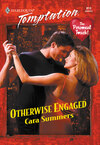Читать книгу: «When The Lights Go Out...»
Max saw Blythe waiting at the elevator
He slowed, giving himself the pleasure of simply looking at her in the little black dress. No more than a slip, really, and it hugged every curve.
If he closed his eyes, he could remember exactly how the curves had felt in his hands.
He quickened his step, moving silently, and sneaked up behind her. “You’re not escaping from me,” he whispered into her ear.
Blythe jumped and shivered in his arms. “Go back to the party,” she said, sounding panicked. “What if my roommate catches you?”
Max started to tell her exactly how little he cared if Candy caught them, but realized he had a much better use for their few stolen minutes. Gently he turned her toward him and bent his head way, way down to kiss her. She moaned and wrapped her arms around his neck.
The elevator came and he backed her into it. His fingertips were at the hem of her skirt before the doors closed….
Dear Reader,
The words When the Lights Go Out once conjured up images of romance, mystery and excitement in my mind. During last August’s East Coast blackout, those words took on a whole new meaning. In Manhattan where I live, no lights also meant no stoplights at the intersections, no subways, no trains to the suburbs, packed buses, closed groceries and restaurants and no elevators in a city of skyscrapers. Worst of all, there were people in those subways and on those elevators when they ground to a halt.
New York rallied, as it always does. There were unheard-of demonstrations of good manners at those unlighted intersections, and city dwellers invited stranded suburbanites to sleep over. When I discovered my neighbors stuck in the elevator, I’d love to report that I was as levelheaded and resourceful as Blythe Padgett. Alas, my rescue efforts involved a lot of running up and down the stairs while trying to get 911 on the phone, and in between, shouting hysterical words of encouragement down the elevator shaft.
I wonder how many people ended up in the wrong bed like Blythe and found their lives changed forever. That’s something we’ll never know, because they’re not telling. Forgive me, Blythe and Max, for revealing your deep dark secret….
Barbara Daly
bdalybooks@aol.com
Books by Barbara Daly
HARLEQUIN TEMPTATION
859—A LONG HOT CHRISTMAS
887—TOO HOT TO HANDLE
953—MISTLETOE OVER MANHATTAN
When the Lights Go Out…
Barbara Daly

MILLS & BOON
Before you start reading, why not sign up?
Thank you for downloading this Mills & Boon book. If you want to hear about exclusive discounts, special offers and competitions, sign up to our email newsletter today!
Or simply visit
Mills & Boon emails are completely free to receive and you can unsubscribe at any time via the link in any email we send you.
To all those friends with whom I shared the August 2003 blackout—to the doormen who stayed on, to my husband, George, and our stranded houseguest Eitan for cheerfully eating tuna salad sandwiches for dinner in the dining capital of the United States.
And especially to my neighbors the Pingitores, who retained their elegance and dignity throughout their long ordeal in the elevator, and to those tireless NYPD officers who rescued them.
Contents
Chapter 1
Chapter 2
Chapter 3
Chapter 4
Chapter 5
Chapter 6
Chapter 7
Chapter 8
Chapter 9
Chapter 10
Chapter 11
Chapter 12
Chapter 13
1
“WHATCHA GOTTA DO IS gut up and frigging go for it.”
“Frigging?” Blythe Padgett looked up at her best friend, her roommate, her co-worker, her guardian devil. “Very good, Candy. Last month it was effing. You’ve toned it down another notch.”
“Bart’s on my case.” Candy Jacobsen was a tall, beautiful blonde with a mouth as filthy as the pan the mechanic drained your old oil into. Her passion for expletives was only one of the reasons her news stories invariably needed a rewrite, a task Blythe was performing at this very moment, providing Candy the time and space to interfere in her life.
Not that Candy needed much time to interfere in Blythe’s life. Not at any time in the seven years they’d been friends had she ever been too busy to do that.
She didn’t need much space, either. The New York Telegraph offices occupied three floors of a large, undistinguished building in Times Square. City Desk editor Bart Klemp and his crew of reporters and staff, including Blythe and Candy, occupied the fifth floor, which was basically one enormous high-ceilinged room with scuffed hardwood floors and grandly proportioned, infrequently cleaned windows.
At one time, the office had contained nothing more than rows of desks. The sounds of clacking typewriters and jangling phones must have bounced off the walls and ceiling to create a din loud enough to rattle those big windows. Then someone had come up with the bright idea of separate cubicles. These were nothing more than six-feet-high, square doorless partitions made of a porous synthetic material, but they at least gave the illusion of privacy and cut down on the noise level. When someone else came up with the even brighter idea of computers, and phones were engineered to announce incoming calls by flashing or buzzing softly, the result was the busy hum that prevailed outside the cubicle where Blythe was currently trying to fix Candy’s story and Candy was trying to fix Blythe’s life.
Obviously undistracted from her cause, Candy slid off the edge of Blythe’s desk to pace the tiny cubicle a few steps this way and that on her stiletto heels. “If you don’t start strutting your stuff, you’re never going to find another—” she came to a halt, then said “—boyfriend.”
Blythe knew the term Candy had wanted to use, but couldn’t quite bring herself to say “frig-buddy.”
“Because,” Candy said, pointing a long, frosted-pearl fingernail at Blythe, “until you find another guy, you’re not going to get over Thor. You can’t spend your life thinking no man will ever want you just because—”
“His name wasn’t Thor,” Blythe mumbled. “It was Sven.”
“Thor, Sven, who cares? Male meat. Problem was that he was so full of steroids he couldn’t—”
“Candy!” Blythe vengefully deleted cataclysmic and typed in major. It reduced the verve of Candy’s story nicely. Candy could use a bit of verve reduction.
“So what you have to do,” Candy said, “is sleep with somebody. Anybody. Break through the frigging barrier. Then you’ll be okay. Are you about finished with that?”
Candy and Blythe had both landed jobs with the New York Telegraph right out of college. A mere three years later, Candy was a hotshot crime reporter with high hopes of getting a job with the venerable Times. Blythe was still a proofreader. Bart Klemp, the city desk editor, had declared that “Blythe Padgett’s a darned good writer, but she wouldn’t know news if she woke up in bed with it.”
Everybody seemed determined for her to wake up in bed with…something.
Rewrites were currently the biggest thing going on in her life. This one was Candy’s report of a shocking drug bust on a sedate street of town houses in Greenwich Village. As fed up as Blythe felt with the entire world, it was going to read like a story from the Obituaries editor in the cubicle next door when Blythe was finished with it.
“And I’ve got just the guy for you.”
She’d tuned Candy out for a moment, but this statement made her tune swiftly back in. “You what? Who?”
“He grew up next door to me,” Candy said, “so we know he’s not a strangler or an axe murderer.”
“Oh! Wonderful! Those are my top qualifications. Have I ever met him?” One of Candy’s many kindnesses was to take the orphaned Blythe home for holidays. Candy’s family had become her family. In spite of enjoying every privilege money could buy, the Jacobsens were as broken as any family could be and fell just short of being certifiably insane, but any kind of family was better than none. “Oh, no. His parents moved ages ago,” Candy said, “but I kept in touch with him. He’s living in Boston now. I don’t know…he was always sort of special to me, I guess, like the big brother I never had. He’s attractive. And sensitive—for a guy, anyway. I mean, he’s a shrink and a shrink has to be sensitive. He was educated to be sensitive. He gets paid big bucks to be sensitive. I know I can trust him to be nice to you. You could have a few dates and let nature take its course.”
“What’s his—”
“But I have a feeling nature will take its course the second you lay eyes on each other, and he sees what a sexy little hotpot you are.”
Candy was pacing in circles now, and gave Blythe’s curly red hair an affectionate ruffle on her way around the desk, but Blythe still felt irritated. A hotpot was a menu item in a Mongolian restaurant. How could a hotpot be sexy? Candy was really very careless in her use of language. “Candy, come on!” Blythe said, deleting a string of flamboyant adjectives from the news story. “I don’t know anything about this old friend of yours. I might not like him at all.”
“You don’t have to like him. You just have to have sex with him.” Candy fanned herself with a galley proof from the stack on Blythe’s desk. Midafternoon, mid-August, New York—these three factors were more than the air-conditioning in the prewar building that housed the Telegraph offices could handle.
“No way I’d go to bed with a total stranger,” Blythe said firmly. “Certainly not with a man I didn’t like.”
But Candy’s face had taken on a dangerously dreamy expression. “That’s how I lost my virginity,” she said. “I kept saving it and saving it, because my mother said I should save myself for the right man.”
It sounded comfortably motherly, but Candy’s mother still seemed to be looking for the right man—and having gone through three husbands in the search, the evidence pointed strongly toward the likelihood that she hadn’t been saving herself.
“But there never was the right man,” Candy went on like a voice-over to Blythe’s thoughts, “and I saw myself getting older and older without finding him. One day I said, ‘You’ve got to start somewhere.’ So I went straight for the quarterback, not a total stranger, but let’s just say we’d never talked. I’m not sure he knew how to.”
Wellesley, where the two of them had gone to college, Blythe on a National Merit scholarship, was still a women’s college and didn’t have a football team. “How old were you?” Blythe asked, changing “biggest haul of the decade” to “confiscation of a large amount of product.”
“Fifteen.”
“Fifteen! No wonder you panicked!” Blythe removed one last random comma from Candy’s story and sent the file to the printer. “I bet you’re sorry now that you settled for the high school quarterback.”
“Sorry? Honey, it made me what I am today, as sexually healthy as the horse that man was hung like. Whoo. I still get wet just thinking about him.” She licked her lips.
Blythe tried not to pinch her lips together. “Well, thanks for telling me about your friend. What did you say his name—”
“I told him about you, too.”
“Candy, you can’t do that!”
“I can and did.” Candy looked too smug.
“What exactly did you do?” Thinking of the myriad possibilities, the limitless nature of Candy’s imagination, made Blythe intensely nervous.
“Told him you and he should get together. And guess what? He’s coming to New York for a conference.”
“When?”
“Today.”
“How nice. I’m sure the conference will keep him very busy. But maybe sometime in the distant future…”
“Tonight,” Candy said.
“What?”
“Tonight. You have a date with him tonight. Seven o’clock. I’m going to tell my date to meet me here, give you two some frigging—”
Blythe levitated out of her chair and ripped the last page out of the printer so fast the ink trailed down into the margin. “That’s it,” she said. “Now you’ve gone too far.”
“Thanks,” Candy said, grabbing the pages out of Blythe’s hands. “Face it, Blythe, you needed a push.”
“A push, maybe! Not my sad story laid before a total stranger! Not a date with a man who assumes I’m desperate to jump in the sack with him!” She held out her hands in supplication. “We should meet for lunch first, no, coffee first, then lunch. No, talk on the phone first, then coffee, then lunch. We should have e-mailed before he even called me on the phone.”
“Blythe, Blythe…” Candy shook her head. “You’re too frigging conservative.”
“I must have been born that way. It sure wasn’t parental influence,” Blythe said stubbornly, plunking herself back down in her chair. Her parents had died in an automobile accident before they’d had a chance to influence her one way or the other. Although losing them had had a profound influence on what she wanted out of her own life.
“I know, I know,” Candy said, heaving a dramatic sigh of resignation. “Okay, we’ll do it your way. I’ll call him and tell him to ask you out for coffee tomorrow instead. Hope I can reach him.” She glanced at her watch, and her inch-long nails glittered as she moved them around in the fluorescent light of the newsroom. “God a’mighty. I gotta get outta here and cover a takedown in the Bronx.”
As Candy took off at warp speed, Blythe took note of her working clothes—a shrunken-looking cream T-shirt, a natural linen skirt too short to bend over in and a pair of bone-colored, spike-heeled pumps that came to a sharp point well beyond her toes. She resembled a rope of taffy. Blythe chased her to the door of the newsroom. “You sure you want to take the subway up to the Bronx in that outfit?”
Candy paused long enough to look down at herself. “Think I should take a cab? Nope, takes too long.”
She took off again. Blythe gazed after her for a moment, then went slowly back to her desk. As sexually healthy as the horse that man was hung like. As sexually healthy as the horse like which that man was hung.
She blew a nasty-sounding raspberry at the computer. Candy interfered because she cared about her. Blythe knew this, would never forget how Candy had become her champion the moment Blythe entered the freshman class at Wellesley with absolutely nothing going for her but her brains. She didn’t know why she’d awakened Candy’s sympathy, but under Candy’s wing Blythe had blossomed—at least, as much as she was ever going to blossom. She’d made friends, joined clubs, learned to girl-talk, learned to laugh. Still, at times she wished Candy would back off and let her be miserable. This was one of those times.
Resigned, she picked up a stack of galleys and focused her gaze on them. Suddenly, with a flash of monitors going black as computers shut down and the grinding sound of air-conditioning coming to a halt, the world dimmed.
From her cubicle Blythe could hear the newsroom catapulting into chaos. “What the hell?” somebody shouted.
“I’ve lost my story!” came from the Obituaries editor next door.
Blythe got up and darted around the corner to comfort him. “In a minute the generator will kick in,” she assured the hysterical young man who was still staring at his screen and jabbing at the enter key as if that would bring back his golden prose. “You won’t lose the whole story.”
Everyone else in the newsroom seemed to have gotten up at once. Reporters and editors were milling around like a herd of sheep, consulting each other, wringing hands or trying to act blasé. Someone began raising the blinds they’d closed earlier against the searing sunshine, and the omnipresent dust of Manhattan swirled in the harsh rays.
One by one the staffers picked up their phones to find them dead, then stabbed at the keys of their cell phones, only to slam them down in frustration.
Silence fell just as suddenly as the chaos had erupted when their shepherd, Bart Klemp, plodded out from his office at the end of the room, a private office with a door and actual walls that went all the way to the ceiling.
Blythe was reminded of movies in which the benevolent plant-eating brontosaurus moved across the landscape, making the earth tremble with each ponderous step. This was a very odd comparison because Bart wasn’t a particularly tall man and he was chunky rather than obese. It was something in his attitude. Bart always looked as if he and his entire species were about to go extinct, and the thought made him terribly sad.
“I’ve been listening to the radio,” he said, “and the power’s out.”
We know that much without listening to a radio.
Bart’s face turned scarlet. Everybody must have been giving him the same “Duh!” look Blythe probably had on her face. “What I mean is,” Bart said, “that it’s not just us. It’s the power grid that serves the whole East Coast, Toronto south to Maryland and west into Michigan.”
The buzz in the newsroom was like a crowd-noise sound effect on an old radio show.
“Here on the home front, the generator’s not working, either, and the phone system’s down—they need electricity from somewhere, apparently. Anybody wants a briefing in electrical engineering, don’t look at me. All I know is nothing’s working at the Telegraph, and those of you still putting stories together, you’re going to have a hard time getting a circuit on your cell phones.”
Blythe still didn’t have a cell phone, and while she reflected that it really was well past time to be the last on the block to get one, Bart paused to rest a beefy hand on a desk and go even more fully into collapse mode. “I don’t know who’s going to show up from the night crew, so I’d appreciate it if some of you guys would stick around, see what we can pull together for a paper tomorrow afternoon if we get the power back in time. We’ve got radios to get the news, find out if it’s a terrorist attack or a lightning strike or somebody just screwed up, so there’s no excuse for us not to have those stories ready to print just as fast as the Times will.”
Blythe had her hand halfway up in the air. This was a dream come true—not that she was happy the entire East Coast had to suffer on behalf of one of her dreams—but this was her chance. Help get the paper out under impossible conditions. Save the day. Be a hero. Be indispensable.
But Bart wasn’t asking for volunteers. He was reading off a list of names. Hers wasn’t on it.
There it was, in actions that spoke louder than words. She wasn’t indispensable. Not that she didn’t know she wasn’t indispensable to the Telegraph, but it still hurt to have it confirmed. Gone, gone were her dreams of spending a few years being a latter-day Lois Lane, dashing about the city to uncover the facts for a front page story, always on a tight deadline while the entire newsroom waited with bated breath for her return, because if she didn’t get the story, the Telegraph would die a humiliating death in bankruptcy and all would be lost.
That part of the dream she’d have to revise to suit the power outage, but the second part remained intact. That at the end of an endless day, victorious, having saved the paper, she’d go home to her own personal superhero.
Crumpling inside, she turned toward her cubicle to get her handbag. In the background, she heard the political editor ask Bart, “When was our new guy supposed to land? I was counting on him to get out the columns on this City Council scandal…”
Counting on him. When would anybody ever count on her?
Feeling useless and defeated, Blythe walked down the four flights of stairs and onto the street. The subway system wasn’t working obviously, but the buses were. Perhaps a hundred people were waiting at the first bus stop. Twenty minutes later, after several already-stuffed buses had passed them by, flashing the Wait for Next Bus sign, she decided to splurge on a taxi and moved to the middle of the block to flag one down. Fifteen minutes worth of already-occupied taxis later, she knew walking was her only option.
Walking was dangerous. It gave her time to think.
Her stomach lurched with worry. Poor Candy. Was she all right? Was she one of the terrified people stuck on subway trains in the dark and the heat? How would she ever get home? Candy’s poor friend, the shrink. Blythe hadn’t even wrung his name out of Candy, and now she might never meet him.
What was he like, Candy’s friend? You’d expect Candy’s friends to be dingbats, but the ones Blythe had met on those holiday visits had been quite nice people, Candy being the wild child among them. So he probably was nice. And sensitive.
If she’d let Candy have her own way and the power hadn’t gone out and her friend had arrived for his blind therapy session with Blythe—you could hardly call it a date—she would have handled it in her own way. She would have offered him a drink and explained to him that, as fond as they both were of Candy, he ought to know that his friend had grown up to be a nutcase, an instant-gratification freak, a steamroller with no brakes. Well, no, it wouldn’t do to criticize an old friend. She’d put the blame on herself instead.
“I’m delighted to meet you, of course,” she would have said, “but Candy overreacted to my little, ah, problem. You mustn’t feel any obligation to take me out.” And don’t even think about taking me to bed.
And he might have said, “Ha, ha. Candy overreact? You must be joking.” And they might have had a good laugh together and maybe met for coffee sometime.
But this pleasant little exchange wasn’t likely to happen. Blythe didn’t like thinking about what might have happened to Candy’s friend.
His plane might be speeding desperately toward an airport where the air traffic controllers had electricity and the runway had lights, knowing the gas gauge was sinking lower, lower, lower. He’d feel the plane begin to lose altitude and think regretfully of the wild affair he might have had with Candy’s little redheaded roommate, a spitfire, a hot-blooded sex goddess, cursing fate for what he’d missed out on.
Blythe took in a sharp breath. He might have crashed while he was cursing fate.
Now he’d never know the truth, that the only thing hot about her was her hair color. That and her passion for correct spelling and good grammar.
Or he might still be at Logan Airport, simply cursing because his flight had been canceled. Wherever he was, she felt he must be cursing. How could he have grown up next door to Candy without being a world-class composer of creative expletives?
Blythe stopped daydreaming long enough to take stock of where she was. She’d almost done the cross-town part of her journey home. Now for the uptown part. She’d keep walking while she watched for a bus or a taxi. Just thirty-five blocks. Thirty-five blocks was nothing more than a good morning walk. Good afternoon walk. What time was it, anyway? Her watchband had slid around on her sweaty wrist, and she scooted it back. It was nearly six. Okay, thirty-five blocks was a good evening constitutional.
She had plenty of company. The sidewalks were packed in midtown, then thinned out as she moved up Madison Avenue into the East Sixties, where limousine drivers were delivering their wealthy employers home to their town houses. The heat and humidity weighed her down, so she paused occasionally for rest and window-shopping at stores that were closed down, had probably closed immediately after the blackout for security reasons, or to give their owners and managers a slight chance of making it home. Sweating in her flowered skirt and coral T-shirt, shopping didn’t grab her attention.
She ought to look for another job, go somewhere she could feel successful, but she was scared to confront a break in her steady salary and benefits. She was alone in the big city.
She was alone in the big world was what she was. Or would be, if it weren’t for Candy.
If she got any more maudlin, she’d sound like a character in a soap opera. She’d be okay. She could take care of herself. She’d worked hard. That scholarship had given her an excellent education. She just hadn’t found the right job yet, that was all.
Her smile faded as she had a fleeting vision of herself in jeans and a sweatshirt, loading a host of bright-eyed children into a station wagon in the driveway of a spotless, warm and cheery white clapboard house in the suburbs that still smelled of the bacon and eggs she’d cooked for breakfast, the tuna fish sandwiches she’d lovingly packed in their lunch boxes along with rosy apples and bags of chips. This was her other dream, a dream far more important than the Lois-Lane-saves-the-paper dream.
What she really wanted was to be a wife and mother. In her spare time she might write a weekly column in the local newspaper, something on housekeeping. Or parenting. She’d volunteer at her kids’ school, of course, and might even run for City Council in a quiet little suburb in Connecticut or New Jersey where the major issues were fence height and lawn maintenance. She’d keep her brain active, but the children—and her superhero—would come first.
This was a secret she kept in her heart. She didn’t have a single friend, especially not Candy, who would understand. The aggressive, career-oriented women of Manhattan would view homemaking as a nightmare. To Blythe, who’d never had a home and family, it sounded like heaven on earth.
Unfortunately the scene needed a handsome, loving, sexy man to kiss goodbye while the kids piled into the car, a man who could understand and support her dream and even express his love for her and the children by boiling the eggs for the tuna fish salad. She’d find that man someday. Just not quite yet.
At long last, she stepped gratefully into the lobby of the building where she and Candy shared an apartment, expecting the relief of a delicious blast of air-conditioning when, of course, there wasn’t any.
Santiago, the day doorman, was still on the job. “Miss Padgett.” He sounded relieved. “You made it home.”
“Just barely,” she croaked. “All I want is a nice long shower—we do have water, don’t we?”
An uneasy look came over his face. “We have water.” He cleared his throat. “Not necessarily hot water, but water. What we don’t have is elevators.”
She and Candy lived on the twenty-third floor. “I thought the elevators had an emergency backup system.”
He shuffled his feet. “It’s not working. Guess it has to get electricity from somewhere.”
She’d already heard this from Bart. “I know,” she said kindly. “If I want a lesson in electrical engineering, I’ll have to get it from somebody else. Okay, so I’ll walk up.”
“It’s dark, and I mean dark, in the stairwells,” Santiago went on. “I bought all the flashlights the hardware store down the street had left. Take one. First come, first served. I’d walk up with you, but J.R. and I are the only staff here. We stayed on because the night shift didn’t make it in.”
She took a moment to send out hugs to people stranded on subways, stuck in elevators, hoping Candy wasn’t among them. “Have they closed the bridges and tunnels?”
Santiago nodded. “Eddie called in,” he said. “He can’t get out of Brooklyn.”
That definitely took care of her date-under-duress. “I knew we’d live to regret the age of technology,” Blythe said as she headed for the stairs that spiraled up through the building and ended closest to hers and Candy’s apartment. She opened the door and almost lost heart. With no windows in the stairwell, no light reached it at all. But it was the only way home. Grasping her flashlight, she aimed it up into the darkness and got her feet moving.
Second floor, third, fourth, fifth…
She’d never buy a StairMaster. Who needed one, as undependable as New York was.
Sixth, seventh, eighth…
When she’d trapped a wonderful husband and delivered numerous adorable children to worry about, she’d be grateful she’d opted for that house in suburbia. Two floors, three, max. She could hear some noise going on above her. It was comforting, knowing other people were in the building. She wouldn’t have that in suburbia, but then she wouldn’t be climbing twenty-two flights of dark stairs, either.
Ninth, tenth, eleventh…
The higher she climbed, the worse she felt about Candy’s friend. Now, thinking of him in a state of crisis, or worse, she wished she’d been more receptive to Candy’s idea, had let him take her into his arms, kiss her, let nature take its course, just as Candy had assured her it would.
At least pestered Candy for his “frigging” name!
She frowned. The heat and isolation were getting to her. She hadn’t done anything bad to Candy’s friend yet. She couldn’t have taken him into her arms and let nature take its course because he hadn’t gotten there. She still had time to make things right. Feeling she’d had a narrow escape from a level of guilt she’d never get over, she collapsed on the first step leading up to the twelfth floor, drew her knees up, rested her forehead on them and closed her eyes, reflecting on the true value of certain New York status symbols, the Upper East Side apartment, the higher floor.
The noise from above had increased in volume. She suddenly realized that what she was hearing was not the voices of neighbors but frantic pounding and shouting. It galvanized her into action. She could feel her hair standing on end. Someone was being attacked, maybe killed! What manners, to mug somebody during a crisis! And in such a nice, safe building! Was there no honor among thieves anymore?
She had a whistle and a can of Mace she’d carried around in her handbag for two years without needing them. She hoped they still worked. Where was the shouting coming from? She hated to retrace a single precious step. She’d start on the twelfth floor. Dredging up one last burst of energy, she raced up the steps and encountered a locked door.
Бесплатный фрагмент закончился.
Начислим
+8
Покупайте книги и получайте бонусы в Литрес, Читай-городе и Буквоеде.
Участвовать в бонусной программе


























